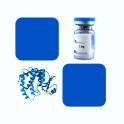
- Remove this product from my favorite's list.
- Add this product to my list of favorites.
Products
Newsletter
 |  |  |  |  |  |

Background:
EpCAM is also known as CO171A, EGP, EGP40,GA7332, KSA, M4S, MIC18, MK1, TROP1, hEGP2, and is a pan-epithelial differentiation antigen that is expressed on almost all carcinomas as 17-1A(mAb) antigen. Its constitutional function is being elucidated. It is intricately linked with the Cadherin-Catenin pathway and hence the fundamental WNT pathway responsible for intracellular signaling and polarity. The epithelial cell adhesion molecule (Ep-CAM) is known to express in most epithelial malignancies and was reported as a tumor marker or a candidate of molecular targeting therapy. Ep-CAM cross signaling with N-cadherin involves Pi3K, resulting in the abrogation of the cadherin adhesion complexes in epithelial cells was reported. And Epithelial cell adhesion molecule (Ep-CAM) recently received increased attention as a prognostic factor in breast cancer.
Source
Recombinant MABSol® Biotinylated Human EpCAM, His Tag, primary amine labeling (EPM-H8223) is expressed from human HEK293 cells. It contains AA Gln 24 - Lys 265 (Accession # AAH14785.1). It is the biotinylated form of Human EpCAM, His Tag (EPM-H5223).
Predicted N-terminus: Gln 24
Molecular Characterization
This protein carries a polyhistidine tag at the C-terminus.
The protein has a calculated MW of 28.2 kDa. The protein migrates as 33-36 kDa under reducing (R) condition (SDS-PAGE) due to glycosylation.
Biotinylation
The primary amines in the side chains of lysine residues and the N-terminus of the protein are conjugated with biotins using standard chemical labeling method. A standard biotin reagent (13.5 angstroms) is used in this product.
Biotin:Protein Ratio
Passed as determined by the HABA assay / binding ELISA.
Endotoxin
Less than 1.0 EU per μg by the LAL method.
Purity
>95% as determined by SDS-PAGE.
Formulation
Lyophilized from 0.22 μm filtered solution in PBS, pH7.4. Normally trehalose is added as protectant before lyophilization..
Reconstitution
Please see Certificate of Analysis for specific instructions.
For best performance, we strongly recommend you to follow the reconstitution protocol provided in the CoA.
Storage
For long term storage, the product should be stored at lyophilized state at -20°C or lower.
Please avoid repeated freeze-thaw cycles.
This product is stable after storage at:
-20°C to -70°C for 12 months in lyophilized state;
-70°C for 3 months under sterile conditions after reconstitution.
(1) "A novel compound-heterozygous EPCAM mutation in congenital tufting enteropathy
Zhao, Yang, Chen et al
Arch Med Sci (2022) 18 (6), 1700-1704
(2) "Understanding the role of Cripto-1 in cancer progression and therapeutic strategies
Zeng, Gao, Zhou
Clin Transl Oncol (2022)
(3) "Oncolytic vaccinia virus expressing a bispecific T-cell engager enhances immune responses in EpCAM positive solid tumors
Wei, Zuo, Chen et al
Front Immunol (2022) 13, 1017574
Showing 1-3 of 9439 papers.
(1) "EpCAM targeted polypeptides, conjugates thereof, and methods of use thereof"
Authors: Benjamin H, et al.
Journal: US20180251524A1 2018
Application: Biopanning
(2) "A simplified procedure for antibody engineering by yeast surface display: coupling display levels and target binding by ribosomal skipping"
Authors: Grzeschik J, et al.
Journal: Biotechnol J 2016
Application: Library Screening by FACS
Welcome Login
Contact us
Follow us